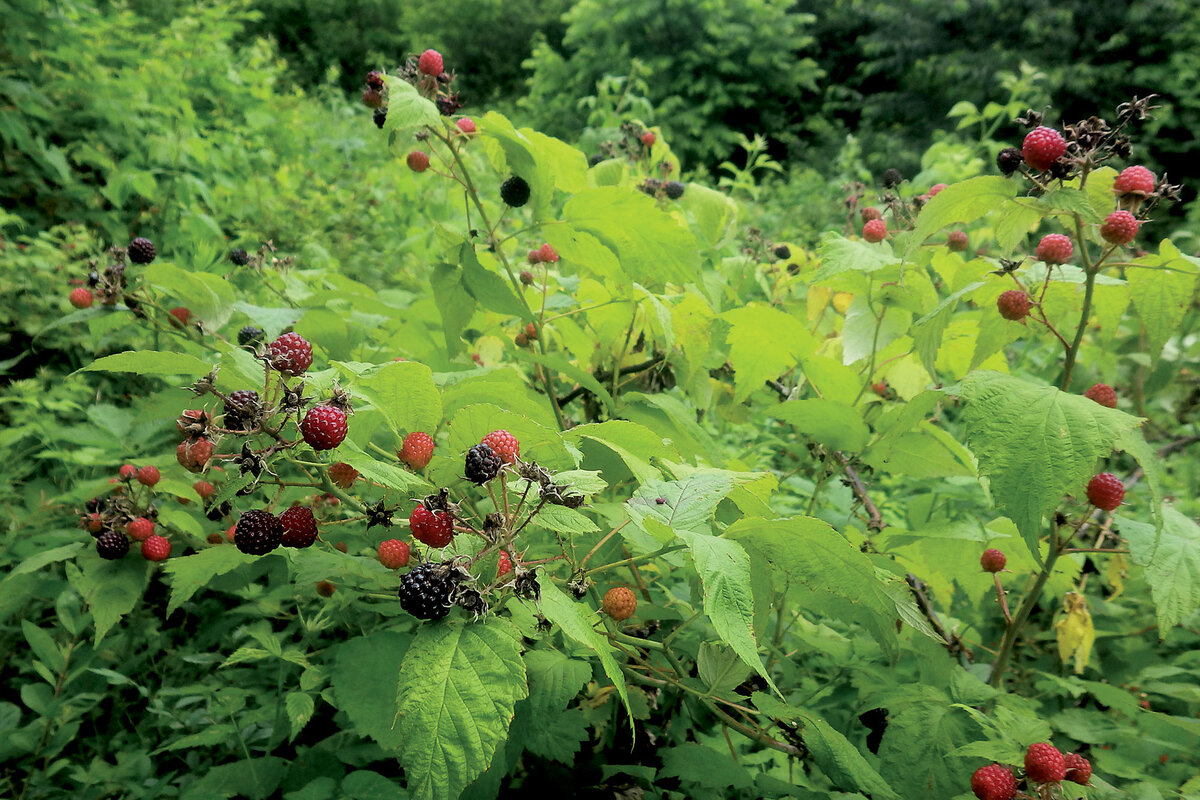My summertime rite of passage? Picking buckets of berries (with bears).
Loading...
Blackcap raspberries are the first true present of wild summer, ripening in central Pennsylvania as June slides in to July. These aren’t August’s blackberries. They carry more sugar and are smaller, more delicate.
My family would go out and pick together, each of us carrying an empty plastic gallon tub of Stewart’s ice cream. After hot days gave way to humid evenings, we’d descend, trying to beat the birds and bears to the harvest.
Why We Wrote This
The long, languorous days of this season may just be the ideal time to revisit childhood memories of summers past. As our essayist discovered, simple pleasures never go out of style.
One night, we picked along a bank where a bear had been feeding. The signs were clear: torn logs, purple scat, berry-stripped patches. Still, we never expected a bear to hang around with humans near. Particularly on land where bears are heavily hunted.
Yet berries will make one linger – human and bear – and so when we were no more than 15 steps away, a bear broke through a ruined barbed wire fence and bolted across the road. In a blink, he’d been swallowed by the creek bed beyond.
We were silent for a long time, in awe of our close neighbor in this shared meeting place.
I have enough self-confidence, or delusion, to believe that whatever world I find after this one will be pleasant. And in my dreaming, I envision I’m welcomed into what an Irish poet long ago called a “bee-loud glade,” with a bowl of vanilla-bean ice cream covered in blackcap raspberries. The dark fruit will hold just enough midsummer sun to soften the frozen scoops, and my teeth won’t ache from the cold.
“There is another world,” a famous quote goes, “but it is in this one.” What else could tie the two worlds together better than the berries that grow from canes purple as memory? These aren’t August’s blackberries. They carry more sugar and are smaller, more delicate, the first true present of wild summer, ripening in central Pennsylvania as June slides in to July. When picked, the raspberry reveals a perfect cap as if you’d pulled a bald man’s wig from his head.
My family would go out and pick together, each of us carrying an empty plastic gallon tub of Stewart’s ice cream. Blackcap thorns aren’t daggerlike in the same way the cockspurs of blackberries can be. They’re smaller and less punishing, but they still catch against clothing and skin. The scratches on hands and forearms carve a shallow map of the hours spent picking. The berries are a species in love with disturbance, and so the canes are not under the thick canopy that covers the mountains, but rather in places where humans have opened the dirt to the sky: along railbeds, under telephone wires, along roadside ditches.
Why We Wrote This
The long, languorous days of this season may just be the ideal time to revisit childhood memories of summers past. As our essayist discovered, simple pleasures never go out of style.
After hot days gave way to humid evenings, we’d descend, trying to beat the birds and bears to the harvest. These were the moments I first felt ursine. I couldn’t stay still as a child, but the crushed canes in the shape of a black bear’s rump showed me how to wallow in one place. How to pick deliberately. There were always berries hiding under leaves near the ground, visible only from a different angle. It paid to wait for them to appear, not to rush past simply picking the most obvious fruit.
One night, we picked along a bank where a bear had been feeding. The signs were clear: torn logs, purple scat, berry-stripped patches. But we often called to each other when someone disappeared behind the thick green foliage, or cursed when we tripped on a log and fell into the thorns, so we never expected a bear to hang around with humans near. Particularly on land where bears are heavily hunted.
Yet berries will make one linger – human and bear – and so when we were no more than 15 steps away, a bear broke through a ruined barbed wire fence and bolted across the road.
In a blink he was on the macadam, and in another he’d been swallowed by the creek bed beyond, likely heading for another patch that bloomed from a 2-year-old logging road on the opposite ridge. We were silent for a long time, in awe of our close neighbor in this shared meeting place.
My family measured foraging success in gallons. Six frozen tubs carried the family of four through a whole year of oatmeal and pancakes.
In the best season, in the year when so much rain fell that the river forgot its banks for a month, we picked 5 gallons in a single afternoon. Instead of reaching with thumb and forefinger, I grabbed by the handful.
But the bounty’s window doesn’t stay open for long. The berries are only ripe on the canes for two weeks if the nights are cool enough. We had to freeze most to keep them from spoiling, stacking them on last year’s wrapped venison to retrieve every morning throughout the year to sweeten our breakfasts. We only ever saved a cup or two fresh for ice cream. But on four or five nights each summer, fresh blackcaps floated on half-frozen rivers of cream and sugar, an idyllic moment of summertime rapture.








